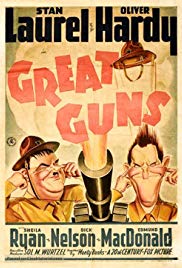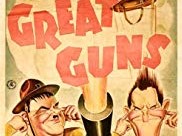Great Guns *** (1941, Stan Laurel, Oliver Hardy, Sheila Ryan, Dick Nelson) – Classic Movie Review 9439
Director Monty [Montague] Banks’s 1941 black and white wartime comedy Great Guns stars Stan Laurel and Oliver Hardy, trying only partly successfully to revamp their career with a new studio (20th Century Fox), as soft, young playboy Dan Forrester (Dick Nelson)’s assistants, who get drafted to help him in the war, despite their own obvious shortcomings as soldiers.
It turns out that Dan Forrester (Nelson) is fine, especially after he discovers cute postal gal Ginger Hammond (Sheila Ryan), but Stan and Ollie come up against a tough sergeant called Hippo (Edmund MacDonald).
Great Guns has rather slow-moving, heavy-handed direction by Banks, and there is a lack of enough fresh gags to enliven the tired situation, although, like Abbott and Costello’s Buck Privates (1941) and even the later Carry On Sergeant (1958) showed, at this era you could still get away with this old stuff if you were reasonably sharp enough. And, the script is reasonably entertaining, with a well-written story and some amusing comic highlights. Also, there is a good production, with some welcome character actors, and obviously, Laurel and Hardy are always worth a look, older and past military age as they may be.
Italian comic dancer-director Banks (real name Mario Bianchi) was an Italian citizen and married to Gracie Fields and they left England in a hurry and went to America so that he could escape internment as an enemy alien. He finally obtained American citizenship.
Also in the cast are Charles Trowbridge, Ludwig Stossel, Kane Richmond, Mae Marsh, Ethel Griffies, Paul Harvey, Pierre Watkin, Russell Hicks, Irving Bacon and Charles Arnt.
Stan Laurel’s daughter Lois Laurel said that during the filming of Buck Privates, Costello came to Stan several times to ask his advice on comedy matters. Buck Privates was Fox’s attempt to capitalise on the success of Buck Privates.
In the old gags department, Ollie tells Stan that if he ‘must make a noise, make it quietly’, which he previously did in their 1932 short Their First Mistake, repeating a line Stan to their kids in Brats (1930). And the ‘We haven’t eaten in three whole days’, ‘Yesterday, today and tomorrow’ gag is lifted from their 1931 short One Good Turn.
Laurel later recalled the ‘shabby’ treatment he and Hardy received from Fox. Screen-writer Lou Breslow consulted Stan and Ollie on the script, but production meetings were held without them. Stan wanted the film shot in sequence and with rehearsals, as they were used to, but these were refused. Banks did not respond to Ollie and Stan’s comedy suggestions, and Stan was not allowed to take part in the editing. Nevertheless, the film became one of their biggest commercial successes.
© Derek Winnert 2020 Classic Movie Review 9439
Check out more reviews on http://derekwinnert.com



